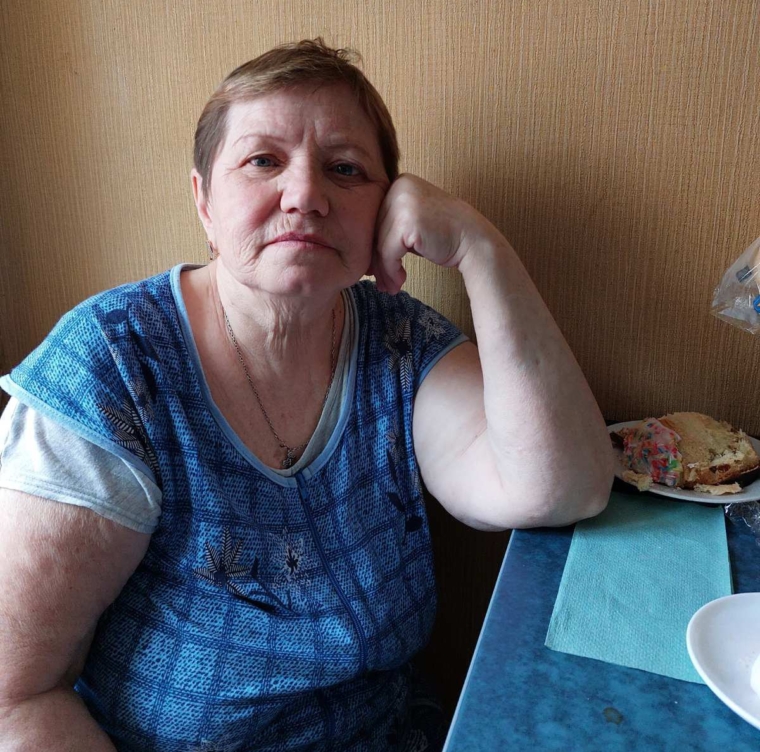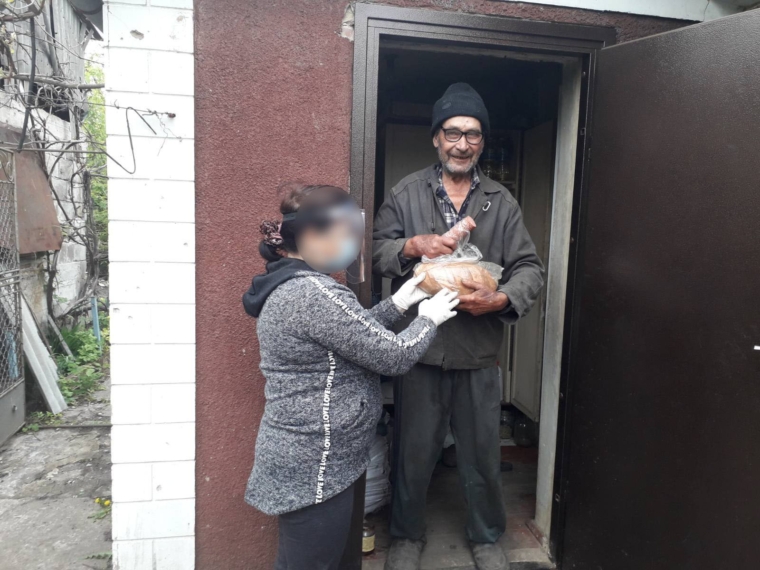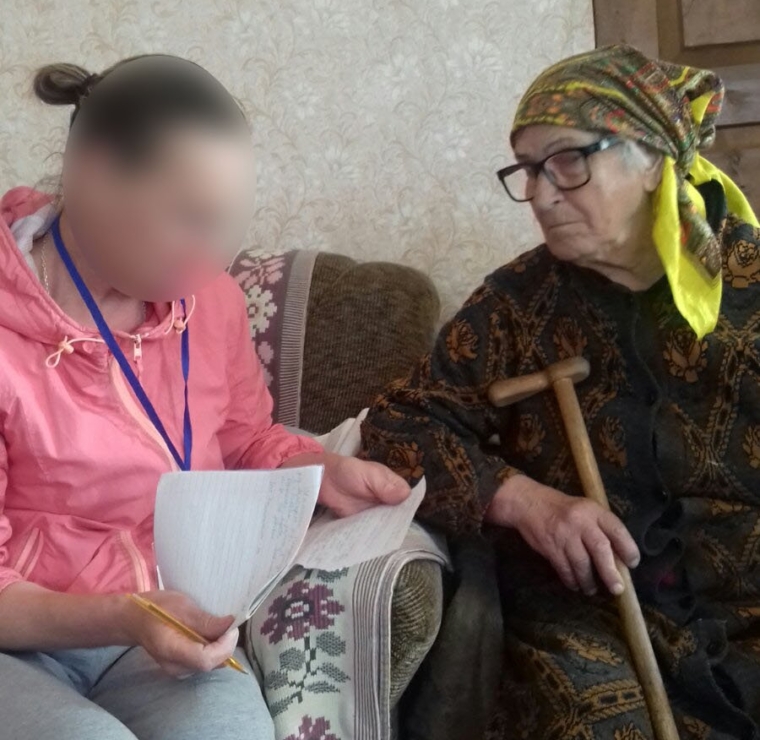Galina had to say goodbye to her grandchildren as they fled from the war zone in eastern Ukraine. The 63-year-old decided to stay put, saying she did not want to be a burden to her family.
Like many older people in Ukraine, Galina felt she had no choice but to stay in the country, while others have been unwilling to leave. Some are alone and isolated with little access to food and medicine, and nobody to care for them or share their grief.
For Galina, the conflict is nothing new. She is scarred by previous fighting in the region and has already moved more than once after her home was hit by a shell and completely destroyed when war broke out in 2014.

She relocated to another village in the Donetsk region of the eastern Donbas, where fighting rages on as Russian forces battle for control.
“I’ve already lost my home once,” she said. “I moved to another village and I don’t want to go anywhere now. I have decided to stay.
“My children moved further from the war zone and they took the grandchildren. I know that it is already very difficult for them, so I do not want to burden them.
“I am extremely worried about them. Often, we cannot call each other because the connection is bad.”
Russian forces have intensified ground, air and artillery attacks in the Donbas region in recent weeks, after Moscow withdrew its troops from near the capital Kyiv at the start of April following a series of humiliating military defeats.
The impact of the conflict has had an immense toll on the older population – one in four people in Ukraine are over 60 years old, with the country having the largest percentage of older people affected by conflict in the world, according to UK-based charity Age International.
For many of the older residents left behind, access to the most basic needs have become an impossible task.
As Galina is unable to withdraw her pension due to no working ATMs nearby she is unable to pay for food. She said before the war, she would travel to a neighbouring village to buy medicine, but now she is unable to get there because it is too dangerous.
“One night there was heavy shelling, everything rumbled, the earth hummed, windows flew out of the houses, the power supply was interrupted and shells stick out in the gardens,” she said.
“This has been happening for eight years, but now they are hitting especially hard.
“Now is a terrible time. Many have been left homeless, including older people. Many of those who left now have no home to return to.”

Alexander, 81, lives alone in Donetsk following a divorce and the death of his son 20 years ago. “I only have my four-legged friends,” he said.
He also spoke of the difficulties in withdrawing his pension, saying in some instances it is only possible after standing in a queue for more than five hours.
Due to his ailing health, Alexander said it is impossible for him to stand that long without feeling pain in his legs. His vision is also impaired by cataracts, he added, but he has only had surgery on one eye as the conflict has all but destroyed the Ukrainian health system in some areas.
Alexander hides from artillery strikes in his bathroom or in his basement and sometimes spends the night there, the only places in his home that have not been struck by shells.
“Russia is killing us,” he said. “Now it’s worse than it has ever been before, just horror. Shells are flying over my head – it’s very scary.
“I’m not scared to die from old age, but from shells, and that there won’t be anything to bury. But I try to reassure myself, I try to live.”
Alexander is determined not to leave and prays for speedy peace, hoping that one day he can have the long overdue surgery to cure his cataract blindness.

Neonila, 83, became a widow two years ago and only has her daughter to look after her at her home in Donetsk.
She has decided to stay because her poor health does not allow her to travel very far. “I only move around the house, with the help of a walking frame,” she said.
She also does not want to abandon her home or village, where she has lived since 1957.
“Over the past two months, my life has changed a lot because of the war and the shelling,” Neonila said. “I live in fear for myself and for my daughter.
“I am separated from my grandchildren. They left for the Czech Republic and I’m very worried for them. I keep in touch with them. There is still an opportunity to talk on the phone.
“Fear is always here until peace comes. But there is always hope for the future and faith that peace will come, that everything will be fine.”
i Ukraine appeal
Age International is a member of the Disasters Emergency Committee (DEC), a group of 15 leading charities working on the ground to support those in and fleeing Ukraine.
i has partnered with the DEC to support their vital work. To contribute, click here or text INEWS to to 70150 to donate £10.
Galina, Alexander and Neonila said they owe their survival to the volunteers from HelpAge International, who bring them food, medicine and hygiene products such as toothpaste, soap and toilet paper to their homes.
Sam Wood, global head of humanitarian at HelpAge International, has been in Ukraine for almost a month to provide support to older people in stricken areas with partners Age International.
He said many institutions set up around the country to shelter the old were already struggling under enormous strain before the Russian invasion on 24 February.
Older people made up a third of all people in need of humanitarian assistance at the start of the conflict, but welfare organisations warn that the international community has failed to recognise this and are yet to identify and respond effectively to meet their specific needs.
Mr Wood recalled how in one institution for the disabled and elderly, longer-term residents were moved to a smaller room to make space for families with children who have become displaced. One room housed ten people, he said, which would be packed with about 40 people during the day as it was the only room with a television.
More on Russia-Ukraine war
“I imagine some of the people bedridden didn’t want them in there. One woman was a stroke victim and another man was blind,” he told i, speaking from Lviv in western Ukraine.
“They were all squished into a room, the only place to hang out. It was a heartbreaking moment.”
Research carried out by Age International found 91 per cent of older people in Ukraine do not have enough food to eat, while 79 per cent did not have access to clean drinking water.
Chris Roles, managing director at Age International, said: “Staying in Ukraine for many not only means they are living in a constant state of fear, but they have also been forced to say goodbye to their families, friends and neighbours who have fled to safety.
“In crisis situations like this, older people are often amongst the most severely affected, yet are at high risk of not being able to access wider emergency relief efforts.”

